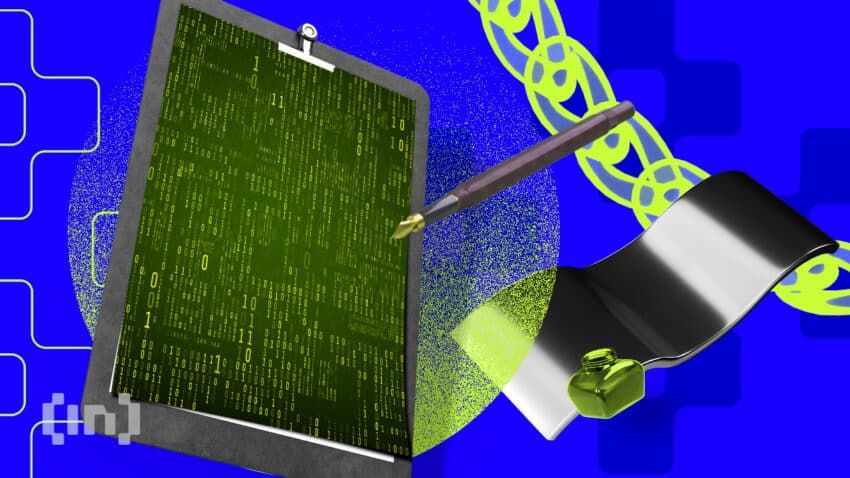An IOU is a common term borrowed from the traditional finance world but a more recent concept in crypto land. But what is an IOU? This article explores the significance of IOUs in crypto and how they can be utilized for blockchain-based transactions.
BeInCrypto Trading Community on Telegram: watch Trading Basics course, read the hottest news on crypto, and get technical analysis on coins & answers to all your questions from PRO traders & experts!
- Traditional IOUs explained
- What are IOU tokens?
- What is an example of an IOU in TradFi?
- An example of an IOU token
- What’s the difference between an IOU and a promissory note?
- How crypto platforms utilize IOU tokens
- Advantages of IOU tokens
- IOU tokens are a TradFi concept improved by blockchain technology
- Frequently asked questions
Traditional IOUs explained

An IOU is a phonetic acronym for ‘I Owe You.’’ It is a popular concept in TradFi that acknowledges existing debt. An IOU represents a document that explicitly showcases and acknowledges a certain amount of debt owed between two parties.
These documents are critical in financial agreements that outline the debt relationship between two parties. An IOU doesn’t necessarily employ a physical document. Instead, it can be a simple verbal agreement between two parties that outlines the amount of debt, timeframe, and conditions for debt repayment.
These IOUs act as semi-formal documents that act as a reminder of the existing debt between the two parties. While some include details of the name of both parties, other times these agreements will only state the debt.
What are IOU tokens?
After learning what an IOU is, it’s time to see how it can be applied to cryptocurrency. IOU tokens are digital assets that represent a debt or promise between two parties issued on a blockchain network. It is a contract that acknowledges a certain amount of debt owed.
Different types of assets can back these tokens. These are often utilized as placeholders for cryptocurrencies that have yet to be launched.
One standout feature of IOU tokens is that they are not tied to any specific currency. It makes it a versatile and cost-effective way to complete transactions compared to traditional methods.
What is an example of an IOU in TradFi?
Here is an example of a traditional agreement:
This IOU agreement is made effective as of date [Date of IOU] by and between [Creditor’s Name] and [Creditor’s Full Name]
1. Debt obligation
The debtor hereby acknowledges and agrees that they are indebted to the credit in the amount of ($1,000) because of [Brief description of crypto transaction or circumstance leading to debt].
2. Dates
The date of this IOU agreement is [Date], and the debt is due to be paid in full as of [Date of Payment].
3. Promise to pay
The debtor promises to pay the creditor the debt, as of this agreement, on or before the stated due date.
4. Amount
The debtor shall pay the creditor the total amount of [Amount Owed] to satisfy the debt. The payment shall be made in the following precise manner: [Specify payment method; bitcoin].
5. Additional details
The debt shall accrue interest at the specific rate of the cryptocurrency per annum, starting on [Date of IOU] until the debt is paid in full.
In Witness of which, the parties have executed this Agreement as of the date written above.
[Creditor’s Full Name] (Creditor) [Debtor’s Full Name] (Debtor)
An example of an IOU token
An IOU token is an on-chain representation of debt, created as an immutable representation of an amount owed between two parties. It essentially stands for something like the following if thought as being a standard IOU.
I, Bob, acknowledge and promise to lend Chelsea the X bitcoin (BTC) amount. In return, Chelsea agrees to repay Bob the borrowed amount of X bitcoin (BTC) before the repayment date.
This IOU token serves as a symbol of good faith for both parties in fulfilling their financial obligation.
How does the technical process work?

- Bob creates the IOU token on a blockchain platform such as Ethereum by acting as a smart contract (a self-executing agreement). This smart contract contains the term and conditions of the agreement, such as payment amount, repayment schedule, and interest rate.
- After successfully deploying the smart contract, the IOU token is generated and sent to Chelsea’s crypto wallet. This acts as a representation of the loan agreement.
- Chelsea will send the borrowed X bitcoin (BTC) amount from her wallet to Bob’s wallet on the agreed-upon loan date. This is inclusive of the interest rate on Bob’s wallet. The smart contract automatically updates the outstanding balance and keeps track of the ongoing repayments.
- After full payment of the agreed amount, including the interest rate, the IOU token is marked fulfilled within the smart contract. Afterward, the loan agreement is considered complete.
What’s the difference between an IOU and a promissory note?
A promissory note serves the same purpose as an IOU. It acts as a reminder and acknowledgment of the debt by a specific date. Nevertheless, promissory notes are far more detailed. Some traditional businesses take a further step in taking promissory notes as a negotiable instrument. Also, both parties involved in the transaction must sign a promissory.
It also contains the name of the payer, the amount of principal owed by the payer of the fee, and the date on which the interest accrues on the principal amount.
The main difference between an IOU and a promissory note is that the latter can act as a legal contract. Thus, this means that a promissory note has legal weight if used in a court of law.
For comparison purposes, here is a simple example of a traditional IOU:
I acknowledge to Creditor X that I’m in debt to them in the amount of $1000.
Signatures
————————————————————————————————————————
Here is an example of a simple promissory note:
I [Debtor’s Full Name] commit to paying Creditor X $1,000. The repayment mode is to be made in the form of four installment payments of $250 at an interest rate of 5%, payable within the first five days of each month until the total amount is payable.
Signatures
————————————————————————————————————————–
Date
—————————————————————————————————————————
How crypto platforms utilize IOU tokens
In a way, IOU tokens have become a bit of a “get out of jail free” card for crypto platforms that have overleveraged and find themselves owing customers money.
After a $72 million hack wiped out user funds on the bitcoin exchange Bitifinex, the platform issued BFX tokens to victims for them to redeem losses. Meanwhile, bitcoin mining pool Poolin issued its clients its own form of IOU token in September 2022 after freezing assets in the pool to protect liquidity.
In a statement, Poolin announced six IOU-tokens issued by PoolinWallet: IOUBTC, IOUETH, IOUUSDT, IOULTC, and IOUZEC and IOUDoge, representing users’ original holdings of BTC, ETH, USDT, LTC, ZEC, and Doge at a 1:1 ratio.
Meanwhile, amid the implosion of FTX in November 2022, the former head of sales at the centralized exchange tweeted asking for opinions, in part on the possibility of an IOU token model to help FTX customers retrieve lost funds.
Also a former director of Bitfinex, Tackett pondered:
If nothing else, a token gives you instant liquidity on your remaining assets […] With a token, there’s also the potential for upside. E.g., BFX converted to equity paid >$2 in dividends + value of Bitfinex equity for every dollar lost.
I don’t know what the token model for something like this would look like, as instead of merely representing debt, there’s the added aspect of existing but illiquid assets that would need to be taken into consideration.
Zane Tackett, former head of instututional sales at FTX: Twitter
In a similar sense, Celsius, the crypto lender attempting to restructure post-bankruptcy, has proposed a potential plan to reimburse customers with a similar IOU token model. The platform wants to create a new token, “Asset Share Tokens” (AST), for creditors. These creditors would be able to sell the tokens, which reflect the value of their assets locked on Celsuis, or HODL, and receive dividends. This news didn’t go down so well on social media, with many commentators bemused at the token offering:
Advantages of IOU tokens
Using IOU tokens for crypto holders has a number of advantages:
1. Security
One of the most common benefits of IOU tokens is their security and assurance to crypto holders. After creating an IOU token, it cannot be changed or deleted. Therefore, it creates a lasting debt relationship that is recorded.
2. Freedom
IOU tokens are not tied to any specific currency. The terms of the IOU can entirely depend on the two parties involved in the agreement.
3. Enforceability
IOU tokens are not legal documents. However, IOU tokens created by platforms that owe customer funds enable an enforceable mechanism whereby debt can be tracked and reclaimed from the debtor.
IOU tokens are a TradFi concept improved by blockchain technology
Blockchain-based IOUs allow traders to create tokens that effectively represent a debt relationship between two parties. These IOU crypto tokens perform a similar function to a traditional IOU but bring with them the benefits of a blockchain’s immutability. There is also clearly a role that IOU tokens can play in returning locked or frozen funds to customers in the event of liquidity crises. In all, IOU tokens are an effective example of reimagining customs and processes from TradFi using DeFi tools and technologies.
Frequently asked questions
What does an IOU stand for?
Is an IOU a loan?
What is an IOU example?
What is the difference between a promissory note and an IOU?
What is an IOU in crypto?
Disclaimer
In line with the Trust Project guidelines, the educational content on this website is offered in good faith and for general information purposes only. BeInCrypto prioritizes providing high-quality information, taking the time to research and create informative content for readers. While partners may reward the company with commissions for placements in articles, these commissions do not influence the unbiased, honest, and helpful content creation process. Any action taken by the reader based on this information is strictly at their own risk. Please note that our Terms and Conditions, Privacy Policy, and Disclaimers have been updated.




